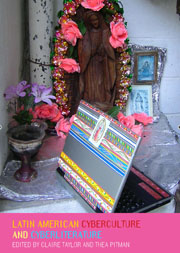Book contents
- Frontmatter
- Contents
- List of Illustrations
- Acknowledgements
- Foreword: Latin American Cyberliterature: From the Lettered City to the Creativity of its Citizens
- Notes on Contributors
- Introduction
- I Cyberculture and Cybercommunities
- II Cyberliterature: Avatars and Aficionados
- A Cyberliterary Afterword: Of Blogs and Other Matters
- Conclusion: Latin American Identity and Cyberspace
- Suggested Further Reading
- Index
Foreword: Latin American Cyberliterature: From the Lettered City to the Creativity of its Citizens
- Frontmatter
- Contents
- List of Illustrations
- Acknowledgements
- Foreword: Latin American Cyberliterature: From the Lettered City to the Creativity of its Citizens
- Notes on Contributors
- Introduction
- I Cyberculture and Cybercommunities
- II Cyberliterature: Avatars and Aficionados
- A Cyberliterary Afterword: Of Blogs and Other Matters
- Conclusion: Latin American Identity and Cyberspace
- Suggested Further Reading
- Index
Summary
Writing the preface for an anthology of texts written by different authors presents challenges very different from those that a book by one sole author requires, not only due to the diversity of the themes, but also of the approaches and writing styles. A preface such as this is, to some extent, forced to read the book in another way, from another perspective, or, to put it better, in another key. And the key to this book can be found, as I see it, in ‘a vast process in which literary forms are being melted down, a process in which many of the contrasts in terms of which we have been accustomed to think may lose their relevance’ (Benjamin 1973: 89). This key phrase is from Walter Benjamin, delivered in a speech given to trade-union leaders in Paris in 1934, and only published in 1966 with the title ‘The Author as Producer’. The topic of his speech is the meaning of poetic freedom in the political Left, suggesting that the key to this liberty can be found in rethinking the ‘received ideas’ about written forms and literary genres, so as to arrive at ‘forms appropriate to the literary energy of our time’ (Benjamin 1973: 89). And since the validity of what Benjamin foresaw is so visionary and illuminating for thinking certain keys to cyberliterature, I feel it is worth clarifying. Having defined his task, Benjamin alerts us to two main obstacles.
- Type
- Chapter
- Information
- Latin American Cyberculture and Cyberliterature , pp. xi - xvPublisher: Liverpool University PressPrint publication year: 2007
- 1
- Cited by



